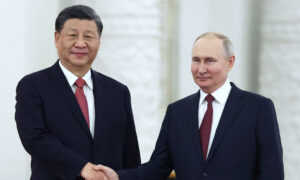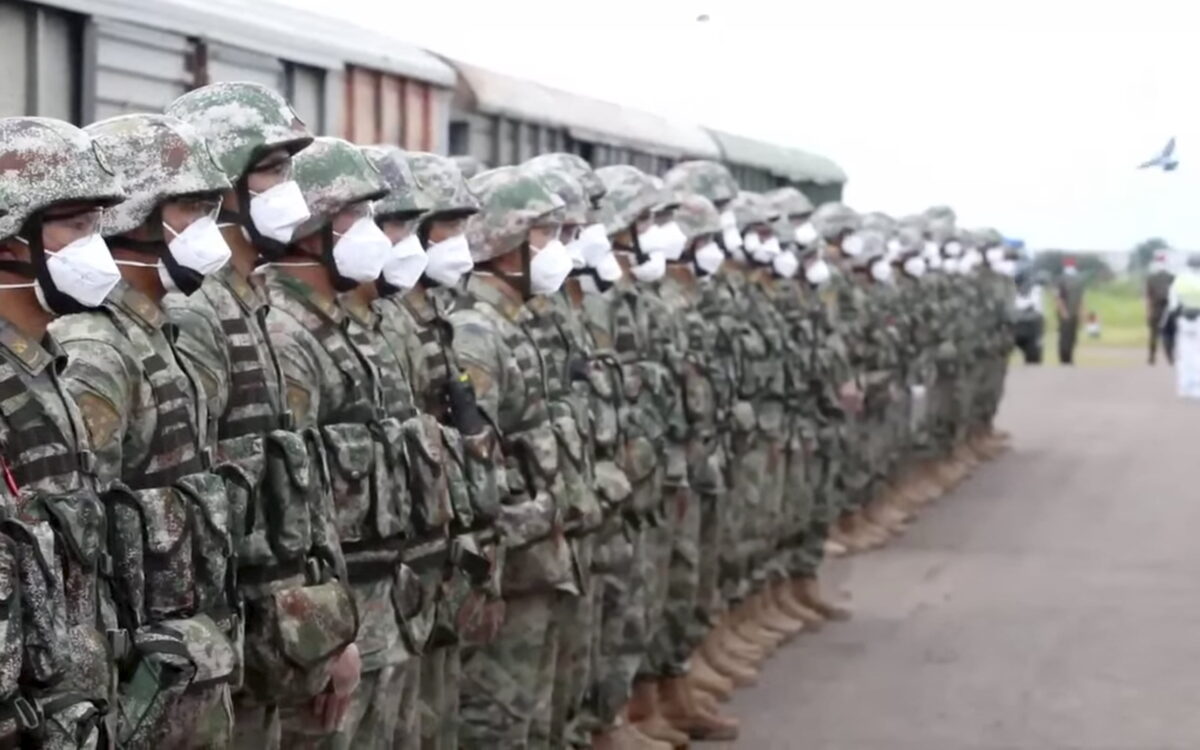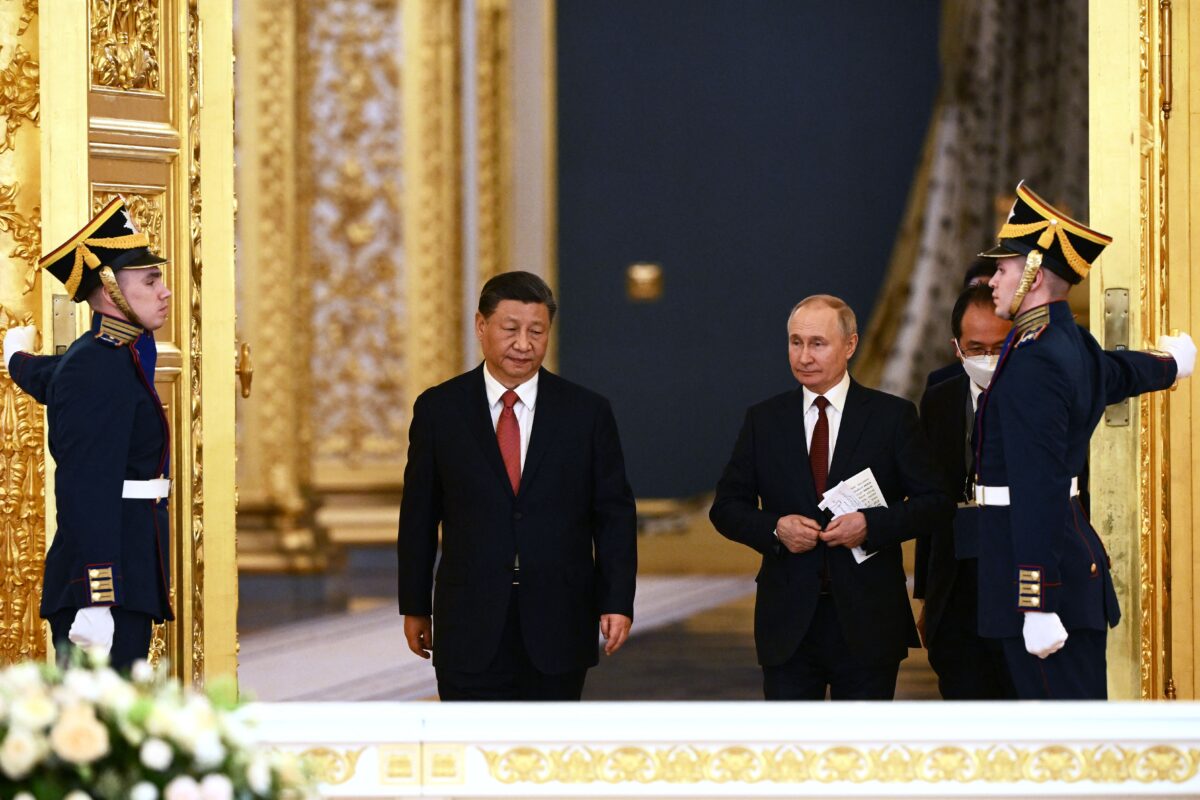The Dragon Consumes the Bear in Its Quest for World Domination
Commentary The recent visit by Chinese leader Xi Jinping to his “friend forever” in Moscow, Vladimir Putin, marks a new phase in Xi’s efforts to create a new world order dominated by authoritarian regimes. The ostensible reason for the visit was to promote China’s peace plan for the war in Ukraine, but the outcome of the visit reveals the true intention. Coming just days after the International Criminal Court (ICC) announcement that a warrant had been issued for the arrest of Putin on charges of having deported Ukrainian children to Russia, Xi’s visit was succour for the embattled Russian leader. In fact, the Chinese regime again rejected the international rule of law, with foreign ministry spokesman Wang Wenbin claiming that the ICC should take an “objective” position, interpret and apply international law in “good faith,” and not use “double standards.” The visit to Russia supported Xi’s three objectives: to unite against a common enemy, the United States; to advance his stated ambition to replace democracy as the global norm; and to establish Chinese hegemony, especially in the Indo-Pacific. After hiding his attitude to the Ukraine conflict, recent events indicate the true intentions of the CCP. The so-called Chinese “peace plan” was never a real proposal for peace. Chinese soldiers arrive to the Grodekovo railway station to participate in war games drills in Grodekovo, Primorsky Krai, Russia, in a still from video released on Aug. 29, 2022. (Russian Defense Ministry Press Service via AP) True peace requires respect for human life and the promotion of human dignity and freedom, values rejected by both Russia and China. The CCP cannot condemn the invasion without undermining its own aspirations to claim Taiwan. Nor can it allow sympathy for Ukraine to take hold in China. Leaked directions to the Chinese media last year included instructions not to post anything “unfavourable” to Russia and “favourable” to the West and to use censorship to filter comments. “China has to back Russia up with emotional and moral support while refraining from treading on the toes of the United States and European Union because in the future, China will need Russia’s support when dealing with America to resolve the Taiwan issue once and for all,” the instructions said. If Putin was to fail, Xi’s own aspirations would be dented. Turning Russia Into a Vassal State Not only has Xi failed to condemn Putin’s unlawful invasion, but he has also provided both rhetorical and material support, his visit being the most obvious example. The sale of gas to China helps to prop up the Russian economy and is critical for China’s prosperity. Equipment that has dual civilian/military use, such as drones and rifles, is being supplied to Russia and utilised in the war. Russia is believed to be relying also on Chinese satellites and other equipment in the conflict. Xi also used the visit to sponsor an alternative international forum, the CCP’s High-Level Dialogue with World Political Parties High-Level Meeting of New Global Civilisation Initiative [GCI]. This is to counter the United States’ Summit for Democracy and advance his stated global totalitarian agenda. Xi told Putin that “change is coming” and that they were driving it together. Russian President Vladimir Putin and Chinese leader Xi Jinping enter a hall during a meeting at the Kremlin in Moscow on March 21, 2023. (Alexey Maishev/Sputnik/AFP via Getty Images) An increasingly desperate Putin was grateful for Xi’s endorsement, but the meeting revealed his weaknesses. Russia is increasingly economically dependent on China, a position that Xi will exploit to reduce prices. His ultimate aim, despite the political rhetoric about their “no limits” partnership, is for Russia to become a vassal state. Better still, for China to eventually govern the resource-rich Siberia and the country’s eastern seaboard, north of Vladivostok, enabling greater pressure on Japan and the United States. Perhaps the most bizarre comment was Xi’s endorsement of Putin in next year’s Russian presidential elections. There was no hint of irony that Russia at least pretends to hold elections! While Xi was visiting Putin, another important meeting was also taking place, namely between the Japanese and Indian leaders. Prime Minister Fumio Kishida emphasised the importance of free, open skies and seas in the Indo-Pacific and reiterated the importance of the international rule of law. He has spoken of four pillars for the region: maintaining peace, dealing with new global issues in cooperation with Indo-Pacific countries, achieving global connectivity through various platforms, and ensuring the safety of the open seas and skies. The meeting came as other nations, such as the Philippines, stressed the importance of cooperation with like-minded democratic nations. The Xi-Putin meeting reinforces the need for democratic nations to support the international rules-based order against “might is right” tot

Commentary
The recent visit by Chinese leader Xi Jinping to his “friend forever” in Moscow, Vladimir Putin, marks a new phase in Xi’s efforts to create a new world order dominated by authoritarian regimes.
The ostensible reason for the visit was to promote China’s peace plan for the war in Ukraine, but the outcome of the visit reveals the true intention.
Coming just days after the International Criminal Court (ICC) announcement that a warrant had been issued for the arrest of Putin on charges of having deported Ukrainian children to Russia, Xi’s visit was succour for the embattled Russian leader.
In fact, the Chinese regime again rejected the international rule of law, with foreign ministry spokesman Wang Wenbin claiming that the ICC should take an “objective” position, interpret and apply international law in “good faith,” and not use “double standards.”
The visit to Russia supported Xi’s three objectives: to unite against a common enemy, the United States; to advance his stated ambition to replace democracy as the global norm; and to establish Chinese hegemony, especially in the Indo-Pacific.
After hiding his attitude to the Ukraine conflict, recent events indicate the true intentions of the CCP.
The so-called Chinese “peace plan” was never a real proposal for peace.

True peace requires respect for human life and the promotion of human dignity and freedom, values rejected by both Russia and China.
The CCP cannot condemn the invasion without undermining its own aspirations to claim Taiwan. Nor can it allow sympathy for Ukraine to take hold in China.
Leaked directions to the Chinese media last year included instructions not to post anything “unfavourable” to Russia and “favourable” to the West and to use censorship to filter comments.
“China has to back Russia up with emotional and moral support while refraining from treading on the toes of the United States and European Union because in the future, China will need Russia’s support when dealing with America to resolve the Taiwan issue once and for all,” the instructions said.
If Putin was to fail, Xi’s own aspirations would be dented.
Turning Russia Into a Vassal State
Not only has Xi failed to condemn Putin’s unlawful invasion, but he has also provided both rhetorical and material support, his visit being the most obvious example.
The sale of gas to China helps to prop up the Russian economy and is critical for China’s prosperity. Equipment that has dual civilian/military use, such as drones and rifles, is being supplied to Russia and utilised in the war. Russia is believed to be relying also on Chinese satellites and other equipment in the conflict.
Xi also used the visit to sponsor an alternative international forum, the CCP’s High-Level Dialogue with World Political Parties High-Level Meeting of New Global Civilisation Initiative [GCI]. This is to counter the United States’ Summit for Democracy and advance his stated global totalitarian agenda.
Xi told Putin that “change is coming” and that they were driving it together.

An increasingly desperate Putin was grateful for Xi’s endorsement, but the meeting revealed his weaknesses. Russia is increasingly economically dependent on China, a position that Xi will exploit to reduce prices.
His ultimate aim, despite the political rhetoric about their “no limits” partnership, is for Russia to become a vassal state. Better still, for China to eventually govern the resource-rich Siberia and the country’s eastern seaboard, north of Vladivostok, enabling greater pressure on Japan and the United States.
Perhaps the most bizarre comment was Xi’s endorsement of Putin in next year’s Russian presidential elections. There was no hint of irony that Russia at least pretends to hold elections!
While Xi was visiting Putin, another important meeting was also taking place, namely between the Japanese and Indian leaders.
Prime Minister Fumio Kishida emphasised the importance of free, open skies and seas in the Indo-Pacific and reiterated the importance of the international rule of law.
He has spoken of four pillars for the region: maintaining peace, dealing with new global issues in cooperation with Indo-Pacific countries, achieving global connectivity through various platforms, and ensuring the safety of the open seas and skies.
The meeting came as other nations, such as the Philippines, stressed the importance of cooperation with like-minded democratic nations.
The Xi-Putin meeting reinforces the need for democratic nations to support the international rules-based order against “might is right” totalitarianism.
Views expressed in this article are the opinions of the author and do not necessarily reflect the views of The Epoch Times.












